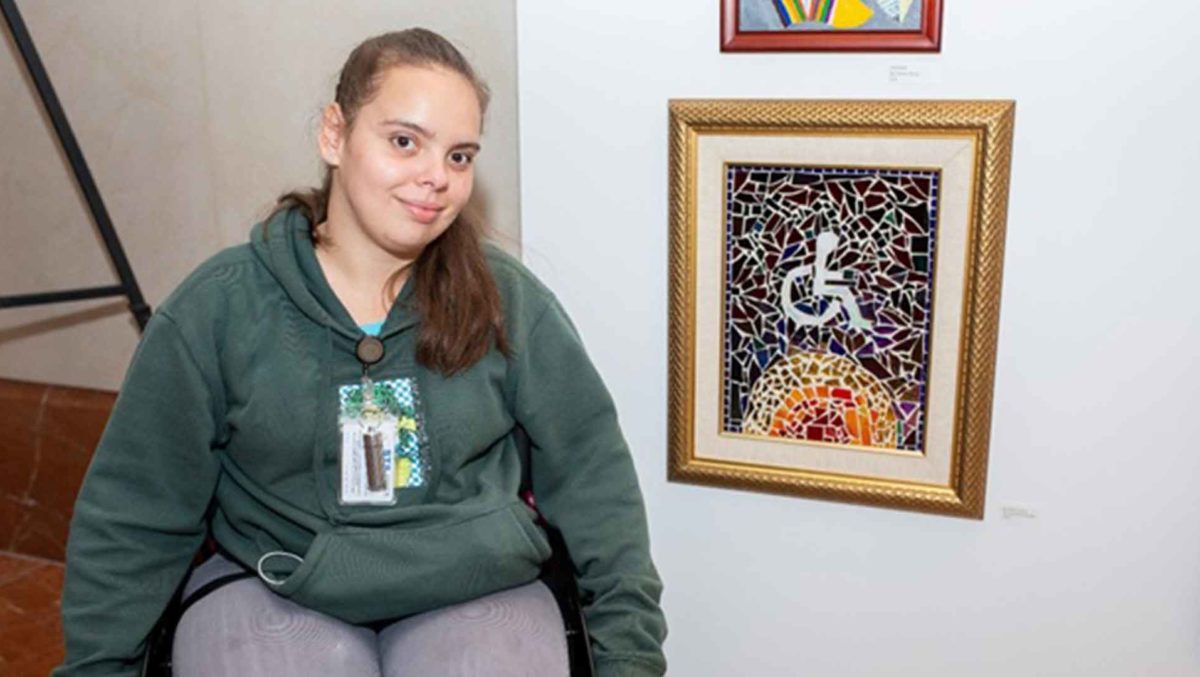“Though the great Waters sleep, That they are still the Deep, We cannot doubt — No vacillating God Ignited this Abode To put it out” -Emily Dickinson
“YP” appears on her identification badge and in a few years’ time she’ll be a young professional in a Young Professionals’ Organization but for now it’s “youth program” at the college-like Camillus campus.
Born in 1997 in the Kendall suburbs of Miami, Raquel grew up with “a lot of time at the beach” in the Keys and teenaged through Homestead before keying back to Tavernier. On the keychain heading south it’s “Key Largo, Tavernier, Islamorada, Marathon, Big Pine Key, Key West,” she summarizes executively like an experienced tour guide.
“I was born premature and that caused me to have something called cerebral palsy,” Raquel explains about the condition that makes her move differently and makes the one with wheels her favorite chair.
Sushi is her “all-time favorite” food. On film—“This is such a cliché. I’m obsessed with Titanic.” And in the book realm—“I like dystopian futuristic stuff, so I’d say like Hunger Games, and things of that nature.”
Raquel’s family hails from Cuba and rains into a handful of U.S. states and perhaps a wet hand can spread as wide as her relatives because, as Raquel writes and photographs recently in the Camillus-FIU collaboration, Neighborhoods of Refuge: A PhotoVoice Project—“Water reminds me of the flow of life. Because once it starts flowing, you can’t stop it.”
When her aunt passed from pancreatic cancer a year into her diagnosis, Raquel started couch surfing through waves of friends’ homes to a shelter she found through “a lot of scared Googling” that held her up before being accepted into the Camillus House Youth Initiative. CHYI houses youth through age 24 who are unaccompanied by adults. Through licensed clinicians, caseworkers, and community partners, this Camillus program provides comprehensive supportive services to access and advance health, socialization, education, work, and other opportunities facilitating eventual autonomy.
Hot showers, clean clothes, meals and room in place, Raquel was then ready to partake in the Camillus House art therapy program on campus to holistically nurture her creative talents. Raquel’s art instructor, Gary, “looks at me one day and goes, ‘Do a mosaic!’” she recalls in comically dramatized falsetto with smiling eyes. A couple of weeks’ worth of work later, a few lessons emerged. “Well, you can’t be scared of cutting yourself with glass, that’s for one, because you’ve gotta break glass,” Raquel intones with timing matched by smiling followed by, “You can’t jump every time you hear a piece of glass break because it does make a noise.”
A tile bond adhesive graciously allows Elmer’s to take a break on this one as the grouting begins “in between the cracks in the tile,” where “you have to fill in the gaps that happen, because that’s the whole point of mosaic…you want to see it all come together—it’s like a giant puzzle.”
Raquel’s favorite thing about Camillus House—beyond Cafeteria Carlos’s homemade fried fish and pineapple upside down cake, the art, and the camaraderie of similarly situated souls—is the simple fact that, thanks in part to caseworkers like Claudine, “if you feel like you need to talk with somebody or you needed advice or need to get something off your chest or have a good laugh with somebody, somebody is there.”
Raquel is preparing to study phlebotomy at Miami Dade College’s medical campus a few blocks from Camillus where she has been accepted for enrollment, and although “people refer to them as ‘vampires’, it’s not just poking people all day,” she assures me. There’s science to it.
In her assurance there is the science of her immigrant aunt’s imploring Raquel to get an education and of her mobility experiences inspiring a medical career to grout the mosaic of her path forward.
Be a Part of Camillus' Story
Our work depends on caring friends – will you join us? Learn more about how you can get involved and support us.
